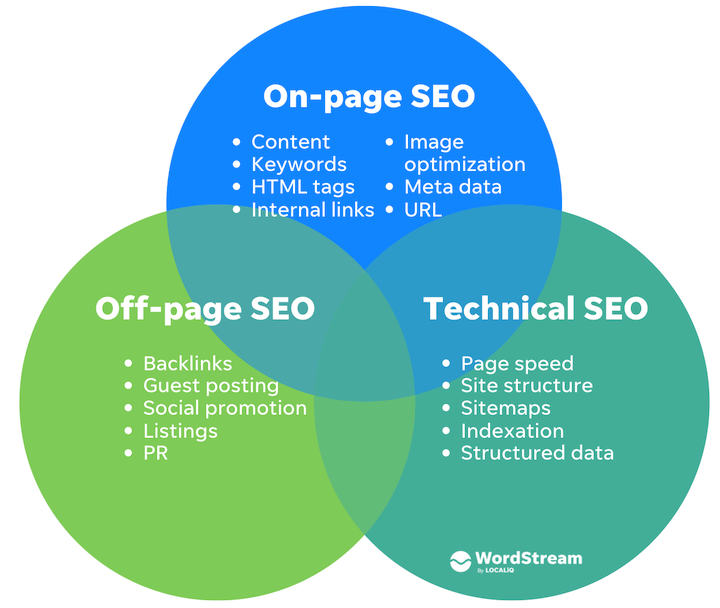
SEO
SEO, also known as search engine optimization, is the craft of refining your website to amplify its visibility in search engine results pages (SERPs), thus enhancing its online presence.
The SEO process combines technical expertise with creative strategies to boost a website’s visibility and, consequently, its ranking. Employing the best SEO marketing practices, a well-optimized website utilizes comprehensive on-page, off-page, and technical SEO strategies to attract more organic traffic and potential customers, requiring continuous optimization for superior performance.
The importance of SEO for your website’s visibility

Considering our inclination to click on the top search results, a website not on the first page is unlikely to attract significant organic traffic. SEO refines your content, structure, and performance, making your site easier for search engines to crawl and index, potentially increasing user engagement and improving your ranking prospects.
The role of search engines in website visibility
Upon entering a search query, search engines comb through the web to showcase the most relevant and authoritative sites in the SERPs. Content relevance, backlink quality, and user experience are pivotal elements in the search engine rankings algorithm, all of which are integral to effective SEO.
Key elements of search page optimization
Search engine optimization also involves technical optimization to boost your website’s performance, making it more favorable to search engines. Focusing on these critical elements is essential for optimizing your site’s performance effectively.
- Metadescription. The meta description acts as your website’s concise advertisement in the SERP, a brief but compelling summary that should incorporate your focus keyword within its character limit to optimize for SEO marketing.
- Headings and content structure. Utilize H1, H2, and H3 tags for your headings and subheadings, integrating your focus keyword to enhance on-page SEO. These tags serve as crucial signals for search engines when indexing content, aiding in content optimization.
- URL structure. A clean and descriptive URL structure is a cornerstone of SEO website enhancement, making it easier for both search engines and users to understand the content of a page. The URL should reflect the page’s content, incorporating relevant search engine optimization keywords to bolster the site’s SEO.
- Content optimization. Crafting high-quality, engaging content is a linchpin for search engine optimization success. Seamlessly embedding your focus keyword within your headings and subheadings is crucial to maintain relevance and captivate your audience, avoiding the pitfalls of keyword stuffing.
- Content relevance. With Google’s Helpful Content updates, the importance of crafting engaging content that excels in search engine optimization has become even more important. Aim for comprehensive, original content, ideally 1500+ words. Forget those little 300-word blog posts. Google’s algorithms now prioritize thorough, well-researched content that is authoritative rather than a reiteration of what’s already available online.
- Off-page optimization. Off-page SEO strategies, such as link building, are vital for amplifying your search engine optimization efforts. This process includes acquiring quality backlinks, securing guest posting spots, engaging in public relations, networking, and using social-media platforms to spread your brand’s message and strengthen your SEO marketing links.
- Technical SEO. Technical optimization is a critical element of best SEO practices, focusing on enhancing your website’s structure and optimizing performance for better crawlability. Technical SEO involves improving load times and ensuring mobile-friendliness, both of which are essential for search engine bots to crawl and index your site.
The power of keyword research

Conducting audience research through keyword analysis is fundamental to the SEO process. It’s imperative to understand which SEO keywords your target audience is using and to strategically integrate those terms into your own content for effective keyword targeting and visibility in searches.
- Leveraging SEO tools such as Semrush, Ahrefs, or the complimentary Google Keyword Planner can offer critical insights and significantly enhance your search engine optimization strategies.
- Learn to use these; they’ll help you identify keyword trends, competition and traffic volume.
- After identifying your SEO target keywords, seamlessly integrate them into your website’s architecture with strategic precision. Incorporate them into your metatags, headings, URLs, and ensure that search engine optimization is evident throughout your content.
- Use keywords to enhance readability, avoiding keyword stuffing, which can lead to Google penalties.
Site speed is a fundamental aspect of technical SEO
A whopping 80% of users expect web pages to load in three seconds or fewer–key to optimizing performance. Not meeting this benchmark can lead to decreased user retention and an increase in your website’s bounce rate. Regularly monitoring your page speed is essential for maintaining search engine optimization and optimal performance.
For optimal SEO results, it’s crucial to optimize your site speed, which includes monitoring image sizes. Target images around 1200 pixels, compress them for the web, and employ caching strategies to make your webpages as fast as they are captivating, thereby optimizing performance.
The importance of responsive design
With mobile devices generating more than half of all internet traffic, Google’s algorithms now prioritize websites that showcase mobile friendliness. Implementing a responsive design with content relevance that provides a consistent user experience across devices, from smartphones to desktops, significantly enhances your SEO ranking.
The lack of mobile friendliness not only turns away mobile users but also risks Google’s penalizing your SEO rankings. Responsive layouts are a standard feature of today’s websites, templates and AI designs. If your site is not in responsive design, it might be time for a website upgrade.
Backlinks should be part of every SEO strategy

Linkbuilding serves as a marker of your website’s credibility, with authoritative industry sites linking back to your content. These backlinks are interpreted by Google as a marker of your authority, positively influencing your search engine optimization ranking. Back links start by building relationships with other people in your industry. Reach out and trade links with them and begin building linking strategies.
Guest posting opportunities that build relationships
Exploring the internet for platforms or publications that welcome guest posts is a savvy SEO strategy for those aiming to boost their search engine optimization and content marketing. Crafting a guest article or blog post for another site is a brilliant way to reach new audiences, increase your online presence, and establish meaningful relationships with other content creators.
Utilizing your unique expertise through guest posting is a potent method for drawing in new followers and enhancing traffic to your website, thus reinforcing your SEO and content marketing strategies. It’s a valuable approach to expand your professional network and solidify your status as a thought leader in content marketing.
Guest-posting is a contemporary take on classic public relations strategies, which are still highly effective. Participating in presentations or speaking engagements is a time-honored technique for gaining visibility and positioning oneself as an authority, thereby supporting your SEO and content marketing endeavors.
SEO is a long-term process that requires continuous effort
To secure your content’s ranking in search results, consistently updating your site with fresh, engaging content is essential. A continuous flow of organic traffic signals to search engines like Google the trustworthiness of your site, potentially easing the journey to higher search engine optimization rankings.
Live content is when search engine crawlers go to work
When new content goes live, search engines send crawlers to index the fresh material. Aid this process and amplify your SEO by implementing H1 and H2 tags for headlines and subheadings, and by adding alt tags for images, which also facilitates content optimization through internal linking.
The importance of an internal linking strategy
Develop a internal linking strategy across your relevant content where relationships exist. These internal links not only enhance SEO but also captivate your audience for longer, helping to decrease bounce rates and improve search engine optimization.
Beyond nurturing internal connections, integrate external linking to authoritative resources that resonate with your industry niche. This tactic not only augments your content but also bolsters your SEO and search engine optimization efforts.
Start blogging to increase your Google authority

Elevating your SEO strategy can be effectively achieved by adding fresh, new content to your website. How best to accomplish this? Embark on blogging. It serves as an outstanding platform for weaving in blog posts rich in keywords and bolstering your Google authority. If teamwork is an option, distributing the blogging responsibilities can be beneficial.
- Create an editorial calendar and be on the lookout for what’s trending and topical.
- Think about interviewing colleagues or team members.
- Content curation can be an excellent way to share someone else’s good content.
- Opt for SEO-enhancing tools to optimize your workflow: An AI writer, an AI image creator, and an AI content rewriter can be game-changers.
- Tools like Quillbot stand out for their ability to summarize articles, contributing to your SEO efforts.
Contact Top of Mind Marketing. We’re developing authoritative websites and SEO processes that help our clients show up on SERPs.

